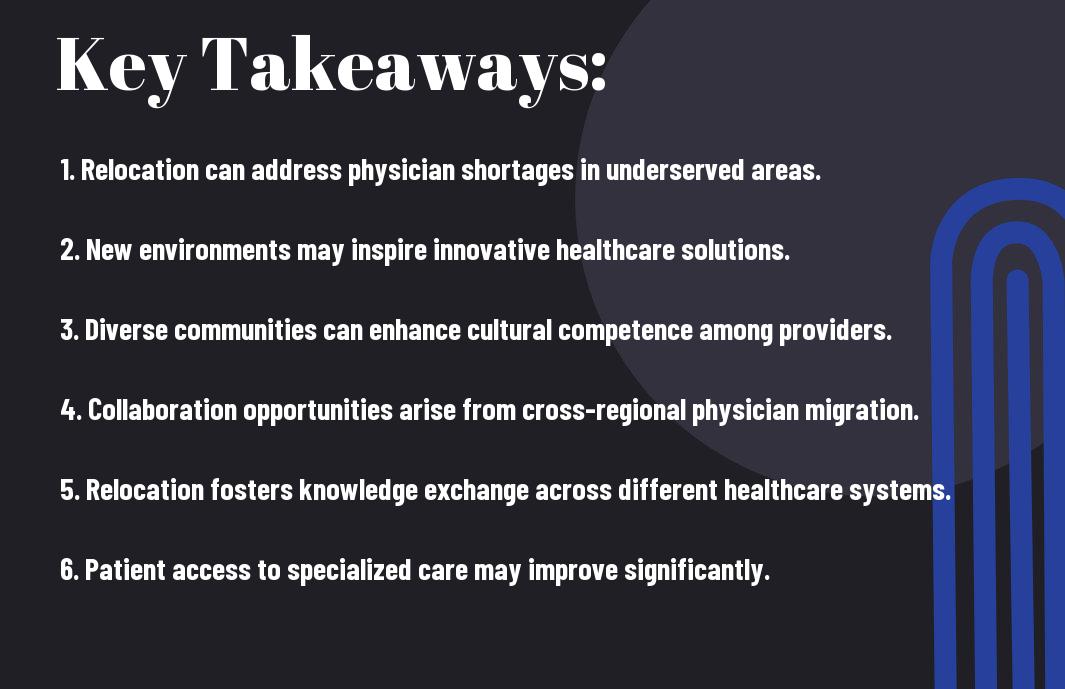The Current State of Doctor Relocation
A significant aspect of the healthcare system is the relocation of doctors, which can have a substantial impact on your access to medical care. As you consider the process of doctor relocation, you may wonder how it affects the overall healthcare landscape.
The Challenges of Rural Recruitment
Beneath the surface of doctor relocation lies the challenge of recruiting medical professionals to rural areas, where you may face difficulties in finding suitable candidates to fill vacancies, ultimately affecting the quality of care you receive.
Urbanization and its Effects on Healthcare
The trend of urbanization has significant implications for your healthcare, as it leads to an uneven distribution of medical professionals, with many doctors relocating to urban areas, leaving rural areas with limited access to medical care.
With urbanization continuing to shape the healthcare landscape, you will likely see a rise in specialized medical services in cities, while rural areas may struggle to provide basic healthcare services, highlighting the need for innovative solutions to address these disparities and ensure you have access to quality medical care regardless of your location.
The Potential Benefits of Doctor Relocation
It is necessary to consider the advantages that doctor relocation can bring to the healthcare system, and as you explore this topic, you will find that it can lead to improved healthcare outcomes and increased accessibility.
Increased Access to Healthcare in Rural Areas
With the relocation of doctors to rural areas, you can expect an expansion of healthcare services, enabling you to access medical care more easily, regardless of your location.
Diversification of Medical Specialties
Any movement of doctors to new locations can bring a range of medical specialties to areas where they are needed, allowing you to benefit from a broader spectrum of healthcare services.
For instance, as doctors relocate, you may find that your local hospital now offers specialized services such as cardiology or oncology, which were previously unavailable, giving you access to more advanced medical care and treatment options, thereby enhancing your overall healthcare experience.
The Process of Doctor Relocation
There’s a growing trend of doctor relocation, and you may be wondering how this process unfolds. As you consider relocating, you’ll need to navigate a complex system, involving licensure, credentialing, and registration in your new location.
Incentives for Relocation
Beneath the surface of doctor relocation lies a range of incentives, offering you attractive benefits, such as financial bonuses, student loan forgiveness, and enhanced career opportunities, making relocation an appealing option for you.
Supporting Infrastructure for Relocating Doctors
Infrastructure-wise, you’ll find that supporting systems are being put in place to facilitate your relocation, including specialized agencies and online platforms that help you navigate the transition and find new opportunities.
And as you examine deeper into the process, you’ll discover that these supporting infrastructures are designed to provide you with comprehensive support, ranging from housing and family relocation services to professional networking events, ensuring a smooth transition for you and your family, and enabling you to focus on your medical practice in your new location.

Overcoming Obstacles in Doctor Relocation
Keep in mind that relocating as a doctor can be challenging, but with the right approach, you can turn these obstacles into opportunities for growth and development in your medical career.
Addressing Lifestyle and Family Concerns
Taking into account your personal circumstances, you should consider factors such as your family’s needs, cost of living, and housing when relocating to a new area, ensuring a smooth transition for you and your loved ones.
Mitigating the Impact of Relocation on Medical Careers
Offering flexibility and support, you can navigate the challenges of relocating your medical career, and your employer or organization can help facilitate a seamless transition, minimizing the impact on your professional development and patient care.
Careers in medicine are built on dedication and perseverance, and when you relocate, you may face challenges such as adjusting to new hospital systems, policies, and procedures, but you can overcome these by staying focused on your goals and seeking guidance from colleagues and mentors, ultimately leading to a successful and fulfilling career in your new location.
Innovations in Healthcare through Doctor Relocation
Once again, the process of doctor relocation can bring about significant changes in the healthcare sector, and you may find that it leads to innovative solutions and fresh perspectives, ultimately benefiting your community.
New Technologies and Treatment Options
Besides the obvious benefits, doctor relocation can also introduce you to new technologies and treatment options that may not have been available in your area, allowing you to stay up-to-date with the latest developments in healthcare.
Collaborative Healthcare Models
Around the world, collaborative healthcare models are emerging as a result of doctor relocation, and you may find that this leads to a more integrated approach to patient care, with multiple specialists working together to provide you with comprehensive treatment.
Considering the potential of collaborative healthcare models, you can expect to see improved health outcomes, as doctors from diverse backgrounds share their expertise and best practices, ultimately enhancing the quality of care you receive, and allowing you to make informed decisions about your health.
Policy Implications and Future Directions
Not surprisingly, the process of doctor relocation has significant implications for healthcare policy, and you will need to consider these as you explore novel opportunities in the field.
Government Initiatives and Incentives
At the forefront of policy development, you will find government initiatives and incentives that can facilitate doctor relocation, and you should consider how these might support your goals.
Private Sector Partnerships and Investments
Across various healthcare settings, you can leverage private sector partnerships and investments to drive innovation and improvement, and you should explore these opportunities as you develop your strategy.
Policy makers and healthcare leaders like you are recognizing the potential of private sector partnerships and investments to transform the healthcare landscape, and you can play a key role in shaping this transformation by fostering collaborations that drive innovation, improve outcomes, and enhance the overall quality of care, ultimately benefiting your organization and the patients you serve.

Final Words
Ultimately, as you consider the process of doctor relocation, you may find that it unveils novel opportunities in healthcare, allowing you to access specialized care and expertise. You can capitalize on these opportunities to improve your healthcare outcomes and experiences. By exploring these new avenues, you can make informed decisions about your care, ultimately enhancing your overall well-being. Your healthcare journey can be transformed through the possibilities that arise from doctor relocation, leading to better health outcomes and a higher quality of life.
FAQ
Q: What are the potential benefits of doctor relocation in terms of unveiling novel opportunities in healthcare?
A: The process of doctor relocation can unveil novel opportunities in healthcare by bringing in fresh perspectives, skills, and expertise to underserved or rural areas. When doctors relocate, they can share their knowledge and experiences with local healthcare professionals, leading to improved patient care and outcomes. Additionally, doctor relocation can help alleviate healthcare workforce shortages, particularly in specialties with high demand. This can lead to better access to healthcare services, reduced wait times, and enhanced overall quality of care.
Q: How can doctor relocation contribute to the development of innovative healthcare solutions and services?
A: Doctor relocation can contribute to the development of innovative healthcare solutions and services by facilitating the exchange of ideas and collaboration between healthcare professionals from diverse backgrounds. When doctors relocate, they can bring new ideas and approaches to healthcare delivery, which can lead to the development of novel treatments, therapies, and services. Furthermore, doctor relocation can facilitate the adoption of best practices and evidence-based medicine, leading to improved patient outcomes and enhanced healthcare quality. This, in turn, can drive innovation in healthcare, leading to the development of new technologies, products, and services that improve patient care and experiences.
Q: What role can doctor relocation play in addressing healthcare disparities and improving health equity in underserved communities?
A: Doctor relocation can play a significant role in addressing healthcare disparities and improving health equity in underserved communities by increasing access to healthcare services and specialists. When doctors relocate to underserved areas, they can help bridge the gap in healthcare workforce shortages, particularly in specialties with high demand. This can lead to improved health outcomes, reduced health disparities, and enhanced health equity. Additionally, doctor relocation can help build trust and cultural competence in healthcare delivery, leading to better patient engagement, adherence to treatment, and overall health outcomes. By addressing healthcare disparities and improving health equity, doctor relocation can contribute to a more equitable and just healthcare system.




